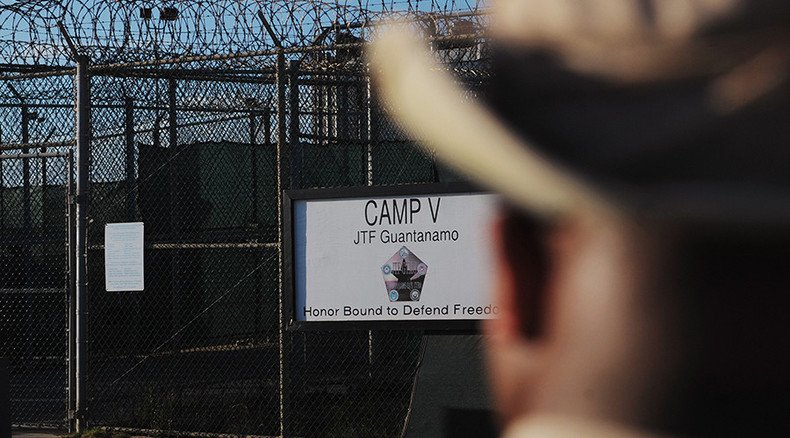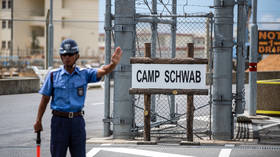Pentagon eyes potential sites for ‘new Gitmo’ on US soil

A Pentagon team will tour a “handful” of potential sites to house Guantanamo Bay prisoners as the Obama administration rushes to close the facility in Cuba. The latest round of visits is feared to spark another round of backlash from local lawmakers.
The Defense Department has not released the list of possible sites, possibly to avoid triggering fierce opposition from lawmakers, senators and governors, which is what happened during the first tours of Fort Leavenworth, Kansas and the Naval Consolidated Brig in Charleston, South Carolina.
The tour of non-military and military sites should help the Pentagon form a plan, required by Congress, for closing Guantanamo Bay and relocating the remaining prisoners. The surveyors will also be looking for a site where military commissions for the detainees can be held, the Pentagon said.
On Tuesday, Pentagon officials along with members of the United States Department of Defense reportedly visited the Navy Brig in Charleston again. The tour was strongly opposed by both residents and officials, local News2 reported.
“Bring them to the White House! Bring them over there, that’s where they belong. If President Obama wants them here so bad, bring them over there to Washington DC, and leave us alone,” Philip Femiani of Goose Creek told the outlet. He plays in a senior softball league less than a mile away from the Navy Brig.
Local senators are also concerned that the Brig does not meet security standards and is too close to schools.
“It’s only a medium-security facility. This would not only have to go to a maximum-security facility, this will have to become one of the most secure facilities on earth,” Senator Tim Scott said.
Scott told News2 that Pentagon officials visited the Brig, discussed costs and analyzed what kind of personnel they would need to staff it. The senator plans to continue urging the Senate and the House to uphold the law as it is.
Governor Nikki Haley vowed to sue the Obama administration if the facility ends up in Charleston.
‘Rubber stamp for endless detention’: Judge rejects Gitmo detainee’s legal challenge http://t.co/Uu2hh3jCLCpic.twitter.com/yhac6PWKRz
— RT America (@RT_America) July 31, 2015Closing the facility in Cuba has been one of President Barack Obama’s promises dating back to his first run for the White House in 2008, but the progress has been meager.
While the Pentagon is moving forward with its plan to close Guantanamo, officials from across the administration realize that doing so will not be easy and would require a significant financial investment. The Pentagon has yet to review the costs of housing the detainees in the homeland or look into what changes need to be done to do so.
"It would be good if possible, to close Guantanamo Bay. If it can be done safely," Defense Secretary Ashton Carter told reporters Tuesday. "It would be a nice thing to do and an important thing to do if we can do it, but we got to be realistic about the people who are in Guantanamo Bay. They're there for a reason.”
At the same time Carter, who supports the idea of closing the facility, did say that it will be “tricky.”
"We'll try to come up with a plan and work with Congress to see if we can do that or not," he said.
Indefinite detention at #Gitmo still a possibility – US Defense Sec. http://t.co/pcZqSnIHWYpic.twitter.com/OisvvqWD37
— RT America (@RT_America) September 2, 2015It is mostly Republicans in Congress who oppose the efforts to close Guantanamo, citing security concerns.
"We're talking about sending high-risk prisoners to military installations to open up even more vulnerability [for service members], or the US prison system which has enough nightmare situations on their own," Rep. Jackie Walorski (R-Indiana) told The Hill. Walorski is behind the restrictions on Guantánamo transfers added in the House of Representatives’ 2016 defense policy bill.
"It just seems like [officials] are under a rush to complete the president's political promise, and common sense isn't weighing into any of these equations," Walorski said.
There are no guarantees that the Pentagon’s plan in choosing the site will be unanimously supported by Democrats, either.
One of the officials The Hill spoke to compared the situation to a game of "political hot potato:” No one wants to advocate for relocating suspected terrorists to the US or take the blame should the plan fail.
As The Hill recalled, Senator Dick Durbin (Illinois), the Senate’s No. 2 Democrat, initially supported a plan to transfer the detainees to a prison in Illinois, Obama’s home state. However, he then changed his mind after a 2011 agreement with Illinois Senator Mark Kirk (R) to secure funds for the prison only if the Obama administration pledged not to move detainees to Illinois.
Obama #Gitmo plan: Kick out half, bring in half http://t.co/BQor1bxTQypic.twitter.com/EhJdkgQNOu
— RT America (@RT_America) July 27, 2015In 2012, the Government Accountability Office (GAO) listed another three facilities suitable for detainees, in addition to Kansas and South Carolina. Two of them were in areas mostly represented by Democrats, but also densely populated districts.
"By and large, Americans don't support having these terrorists brought back to the homeland," Walorski also said.
The Pentagon’s efforts will be futile unless Congress lifts a ban on bringing Guantanamo detainees to the US. The Senate’s 2016 defense policy bill, however, allows the restrictions to be lifted if the White House submits its plan and it’s approved by Congress.
"It's a little hard to predict what's going to happen when there still is no articulated plan from the administration," Walorski said.
The Guantanamo Bay detention camp was opened in 2002 to hold suspected terrorists and is located outside of the US border in a US Navy-controlled part of Cuba. It has faced criticism for the treatment of the detainees, who are held without trial indefinitely and often face torture.
Current and former detainees have made allegations of practices such as forced drugging and sexual humiliation. Nearly seven years since Obama made his promise to close Guantanamo, 116 detainees still remain imprisoned, according to recent data from the New York Times and NPR, despite the fact that 52 have already been categorized as minimal risks and cleared for transfer.












